Thursday Feb 19, 2026
Thursday Feb 19, 2026
Tuesday, 17 May 2022 01:55 - - {{hitsCtrl.values.hits}}
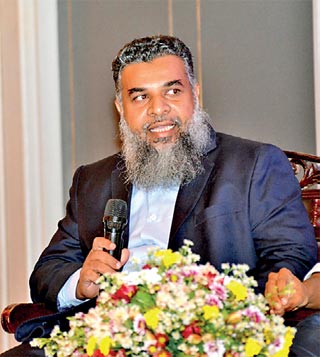
Expolanka Holdings CFO Mushtaq Ahamed
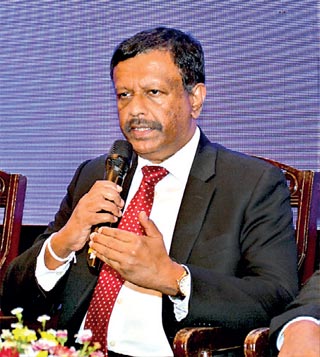
LOLC Holdings Group Managing Director Kapila Jayawardena
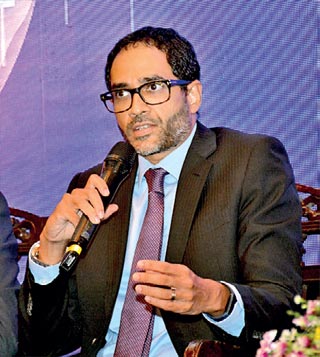
John Keells Deputy Chairman Gihan Cooray
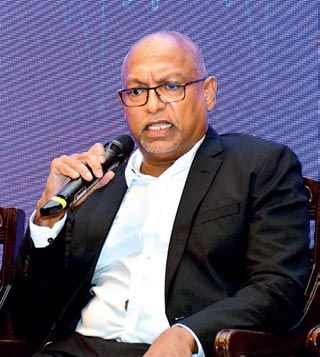
Hayleys Group Executive Director Sarath Ganegoda
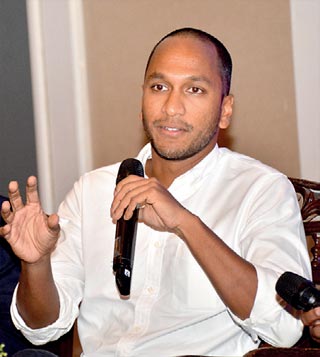
Hela Apparel Holdings Group CEO Dilanka Jinadasa
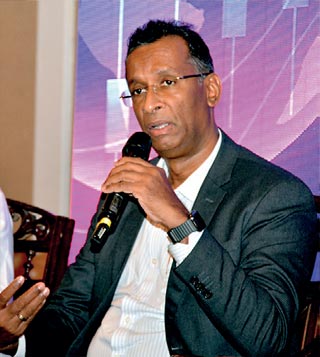
Teejay Lanka CEO Pubudu De Silva
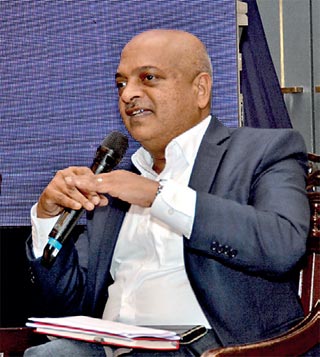 |
| Daily FT Editor and CEO Nisthar Cassim (Moderator) |
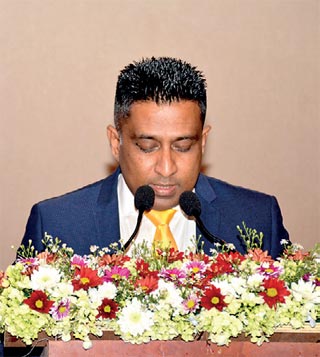 |
| SC Securities CEO Roshantha Fernando
|
Several of the dollar-earnings-rich companies are confident of prospects amidst the country’s unprecedented crisis, a development largely due to internal strategies rather than macro measures though stressing latter was desired.
The Daily FT-SC Securities joint initiative Market Pulse recently hosted several listed conglomerates as well as industry leaders to get an overview of their future outlook. This was preceded by leading stock broking firms unveiling their research on the selected companies. They were Expolanka Holdings PLC, LOLC Holdings, John Keells Holdings, Hayleys PLC, Hela Apparel Holdings PLC, Teejay Lanka PLC and Hayleys Fabrics PLC.
The companies were represented by Expolanka Holdings Group CFO Mushtaq Ahamed, LOLC Holdings Group Managing Director Kapila Jayawardena, JKH Deputy Chairman Gihan Cooray, Hayleys Executive Director Sarath Ganegoda, Hela Apparel Group CEO and Director Dilanka Jinadasa and Teejay CEO Pubudu De Silva.
The research presentations were done by Asia Securities Vice President Research Hilal Zainudeen - Expolanka Holdings PLC, Capital Trust Head of Research Hasitha Leanage - LOLC Holdings and Browns Investments, SC Securities Head of Research Charitha Gunasekere - Hayleys PLC, Bartleet Religare Senior Research Analyst Heshan Chamika - John Keells Holdings PLC and First Capital Head of Research Dimantha Mathews - apparel and related sector trio Hela Apparel Holdings PLC, Teejay Lanka PLC and Hayleys Fabrics PLC. Separately a snapshot of technicals of these counters will be provided by SC Securities Manager Sales Saliya Gamagedara.
Research revealed that all the companies are fundamentally sound and attractively priced with future upside for investors. Their future outlook is promising and will weather the shocks given their diversified nature and strong dollar-earnings capacity. The senior leadership of the companies too confirmed the same view during the discussion moderated by Daily FT Editor Nisthar Cassim.
Expolanka’s Mushtaq Ahamed said the current financial performance of Expolanka Holdings PLC (Expo) reflects the efforts and investments into a strategy initiated 10 years ago. It involved great customer acquisition and procurement strategies. It was emphasised that 95% of the revenue comes from foreign operations/subsidiaries of EXPO established outside Sri Lanka.
Of the Hayleys turnover 50% or $ 600 million comes from exports and Executive Director Sarath Ganegoda spoke of the Group’s diversification strategy and how the company has aligned its portfolio of investments and the Hayleys short, medium and long term direction.
In terms of short-term referring to driving profits and liquidity, he said reliance is on Hayleys traditional sectors whilst in terms of medium to long term stability and growth comes from relatively new sectors and investments such as renewable energy and leisure sectors.
“These are cash-hungry with long gestation periods hence will be a drain on our profitability and liquidity in the short-term, but we expect them to continue to contribute to our growth strategy,” Ganegoda said.
However, it was also pointed out that on-going economic and political crises indeed have posed challenges to this strategy hence Hayleys is taking a relook at the entire diversification strategy and adjusting the way forward accordingly. In terms of restrictions on lifestyle white goods and electronics imports, Ganegoda noted that demand remains, but the challenge was fulfilling it.
LOLC’s Group MD Kapila Jayawardena acknowledged that it is turbulent times both locally and globally. Whilst noting the research presented was good overall, some of the forecasts made may look different going forward especially with the steep devaluation of the currency and hike in interest rates.
He said that as per LOLC Balance Sheet, local and foreign assets are equal at 50% each whilst 40% of profits come from overseas. “If you do a trend analysis, during the past 10 years the Group has been consistently investing overseas,” he said, adding that in 2020, the sale of stake in PRESAC, Cambodia valued at $ 1 billion, and repatriation of sales proceeds saw Rupee appreciate.
He said that LOLC Group is investing considerably in the Maldives, which offers the highest Return of Investment in the leisure sector within the Asia Pacific region.
“When we are struggling to get $ 150 in Sri Lanka, in the Maldives a rate of $ 1,000 could be easily obtained for the room despite being a single product destination. In contrast Sri Lanka has rich diversity for tourists,” he added.
JKH’s Deputy Chairman Gihan Cooray spoke of a couple of re-rating investments of the Group. One was Cinnamon Life, which is nearing completion and will soon begin to generate cash. In the medium to long-term of the transportation sector is the investment in the Colombo West Terminal project which will enhance JKH’s exposure to a high growth strategic sector. There have been a lot of capacity building initiatives in the recent past and ongoing. Whilst there will be some volatility in the short-term including in consumer related business, the JKH’s leisure sector business in the Maldives and the largely dollar-denominated transportation sector will help. He also said 50% of JKH’s profits come from dollar denominated businesses.
Cooray also pointed to future benefits from JKH’s efforts in the past two years in the advanced analytics transformation journey of the Group. He said it will help offer more value to customers across the group seamlessly and efficiently. “We are starting to see positive results already despite the pandemic and disruptions,” he added.
Teejay Lanka CEO Pubudu De Silva said the global apparel market is heading towards $ 2 trillion mark whilst the local industry has grown to increase its share despite the challenges. Pre-COVID apparel exports were $ 5.6 billion, and they dropped to $ 4 billion due to the pandemic and recovered to $ 5 billion mark thanks to the sheer resilience. It was revealed that in the 2022 first quarter the industry has reverted to pre-COVID performance. However, De Silva emphasised that Sri Lanka has the potential to achieve more in terms of apparel exports. Speaking about Teejay, he said that the Company invested $ 26 million to expand capacity in India and expressed confidence of becoming a $ 300 million company in FY22. The focus is on further capacity fulfilment.
Hela Apparel’s Group CEO and Director Dilanka Jinadasa spoke of the headwinds and tailwinds of the apparel industry. He said among factors to watch are whether the demand from the Western markets will be sustainable especially with inflation on the rise and how the industry navigates. He said that Hela having expanded from a Rs. 500 million business 10 years ago to a Rs. 200 billion turnover in FY22 needs a lot of working capital given the rapid growth and the challenge was whether the banking sector can support with the required dollar liquidity.
Current and upcoming operating environment
The business leaders were also questioned about the current and upcoming operating environment especially with higher interest rates and planned increase in taxation. However, all of them stressed on the importance of ensuring business continuity and impact of higher taxation as secondary.
Hayleys’ Ganegoda said that to pay taxes companies have to make profits. This can be very challenging in turbulent times, so the focus is more on addressing business continuity aspects.
“In order to boost government revenue via higher taxes, I hope the Government won’t kill the geese that lay the golden egg. Government must encourage reinvestment as well as R&D thereby ensuring exports and employment are retained. Apart from merely increasing the rate, the Government also needs to step up on efficient tax administration and collection,” Ganegoda added.
LOLC’s Jayawardena was of the view that the operating environment will be challenging. “Tax increase apart, the country’s situation is affecting sectors such as tourism.”
“In the medium to long-term we are very optimistic about Sri Lanka. In the short term we need to look outside Sri Lanka to enhance revenues,” Jayawardena added.
JKH’s Cooray said investments such as Cinnamon Life, Colombo West Terminal reflect JKH’s positive outlook on Sri Lanka. “At present the issue is not about taxation which however must come progressively with proper private consultation of the private sector but addressing business continuity, supply chain issues. We have seen a lot of SME level businesses impacted,” he said.
TeeJay’s De Silva said costs have risen but focus is on operational excellence, improving productivity and efficiency with technology and digital transformation as well as product transformation to add value. Initiatives such as pursuing ESG framework helps companies to improve their competitiveness.
Hela’s Jinadasa said business continuity issues, dollar liquidity and support from the banking sector were listed as important.
Enhancing shareholder value
The panel of business leaders was posed with the question how important and what they are doing in terms of enhancing shareholder value.
LOLC’s Jayawardena said: “We have been driving shareholder value via diversification. This is both domestic – from a financial conglomerate to trading, plantations, leisure, as well as diversifying into regional markets such as Asia, Africa, India as well as talking to some financial institutions in Russia among others. Given turbulent conditions in the Sri Lankan economy we have been hedging our risks overseas. We will continue on this path of diversification.”
He said another means of driving shareholder value is through mergers and acquisitions. He referred to the recent merger of the two large financial institutions – LOLC Finance and Commercial Leasing and Finance into one bringing major synergies into the financial sector business.
“This will help us to put greater focus on our core business, grow our profitability and enhance shareholder value,” he added.
“In terms of rewarding our shareholders, if one takes a medium to long term view, there has been an increase in the value of LOLC shares. In the past decade, the average appreciation is close to 30%. Of course, in the future, we might change some of these strategies but at present we are fully focussed on the bottom line. The FY22 results will reflect this,” Jayawardena added.
JKH’s Cooray said diversification has been a key part of JKH’s DNA and has helped the Group over the years. JKH has continued to invest amidst turbulent times to create a strong platform for future growth.
“We have refurbished our entire resort portfolio in the Maldives whilst improvements were made to the properties in Sri Lanka as well. Despite the recent setback, we saw tourism rebounding in Sri Lanka earlier on and confident that it will reach pre-COVID levels like it happened in the Maldives. With the giant Indian market booming, the opportunities for tourism in Sri Lanka are far greater and Cinnamon Life will be a catalyst in creating demand. The Colombo West Terminal too will further enhance shareholder value in the long term,” Cooray added.
Expolanka Ahamed said the Group has been addressing measures to enhance growth. “In the past three years we have grown from $ 500 million to $ 1 billion and to $ 3 billion in FY22. This was possible due to focussed strategies.”
He explained that one is that Expolanka has on-boarded more strategic customers than three years ago. “We also diversified the customer base from a predominantly apparel focus to pharmaceuticals, electronics and automobiles etc. In doing so we build new competence. The other is expanding our global footprint in Asia and Americas taking advantage of dynamics in global trade. In the last 18 months we made three strategic acquisitions in the US, the world’s largest market. We also benefited from strength and the capital support from our major shareholder SG Holdings of Japan,” Ahamed added.
He also said Expo was committed to a dividend policy of 22% per annum subject to the availability of free cash flow and required Board and other necessary approvals. “What we have achieved in recent years isn’t windfall profits but hard earned. From the exchange gains, what was reported was only Rs. 11 billion out of Rs. 72 billion driven from fundamentals. We will endeavour to strike a good balance in terms of rewarding shareholders as well as investing into the future of our business,” Expolanka CFO said.
Hayley’s Ganegoda said his Group has been maintaining a consistent dividend policy and it will be continued in the future too.
Why the share price does not reflect company performance was also discussed at the panel.
Ganegoda said the share buy-back is considered when there is excess liquidity whilst Cooray concurred and said the objective of such move is not to boost the share price.
Jayawardena opined that: “why sometimes share price doesn’t reflect company performance is we don’t have forums like this which facilitate general investing public and the management discussion. Sri Lanka is also a very thin market” whilst Ganegoda added low public float could be another factor.
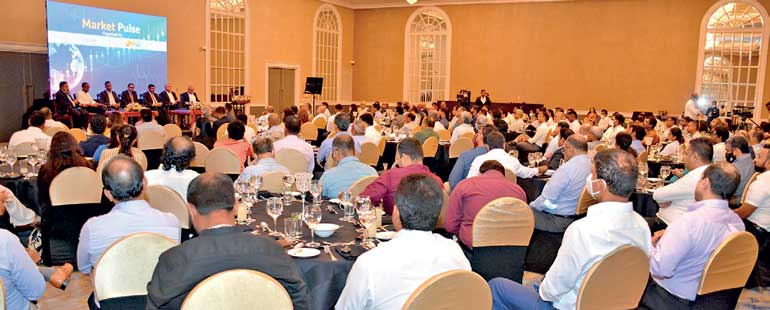
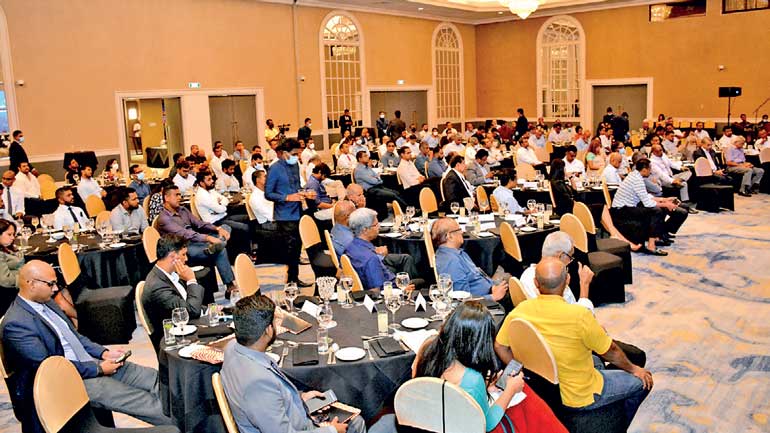
Pix by Upul Abayasekara